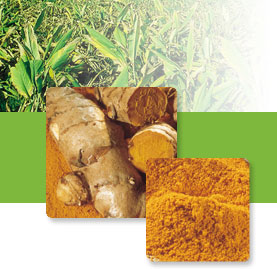 This spice has long been known for its amazing healing properties (just check Wikipedia for a quick review of some of the literature). Well, Turmeric has done it again: in a comprehensive trial that explored the histologic and genetic effects of curcuminoids in animal models, Janet Funk, M.D. (Univ. of Arizona) highlights some very interesting effects of Turmeric on tissue affected by rheumatoid arthritis (RA). Her findings focus on the role of NF-κB (nuclear transcription factor kappa-B), a pro-inflammatory molecule that the body uses to activate genes that cause the short- and long-term changes associated with RA. Turmeric seems to interfere with its expression and theraby reduce the subsequent cascade of inflammation that contributes to chronic pain and joint degradation:
This spice has long been known for its amazing healing properties (just check Wikipedia for a quick review of some of the literature). Well, Turmeric has done it again: in a comprehensive trial that explored the histologic and genetic effects of curcuminoids in animal models, Janet Funk, M.D. (Univ. of Arizona) highlights some very interesting effects of Turmeric on tissue affected by rheumatoid arthritis (RA). Her findings focus on the role of NF-κB (nuclear transcription factor kappa-B), a pro-inflammatory molecule that the body uses to activate genes that cause the short- and long-term changes associated with RA. Turmeric seems to interfere with its expression and theraby reduce the subsequent cascade of inflammation that contributes to chronic pain and joint degradation:"In vivo treatment prevented local activation of NF-κB and the subsequent expression of NF-κB-regulated genes mediating joint inflammation and destruction, including chemokines, cyclooxygenase 2, and RANKL [the receptor activator of NF-κB ligand]," the investigators wrote.
We herbalists know that Turmeric's anti-inflammatory effects are not limited to RA. We've been using this plant since it became available to the West - and Ayurvedic healers have been using it for over 4000 years. But now, thanks to modern science, we have this pearl of wisdom from Doctor Funk:
"Just as the willow bark provided relief for arthritis patients before the advent of aspirin, it would appear that the underground stem (rhizome) of a tropical plant may also hold promise for the treatment of joint inflammation and destruction."
Brilliant.
2 comments:
When using turmeric for inflammatory conditions, do you feel it could be considered too "hot" for some already hot-constitution people? I have never used turmeric as such, but I wonder if somewhat cooler herbs (Mediterranean herbs, perhaps) might be a better choice in some cases?
You bring up a good point, and it quite useful clinically to make those distinctions. With Turmeric, I feel like things can be a bit more complex, for two reasons: first off, it is not the warmest herb, and certainly not as hot as its cousin Ginger. I consider it closer to neutral in temperature, which is evident by its taste, and thus it has a bit more range than a hot remedy like Ginger, Cayenne or Cinnamon.
Second, Turmeric is so good for conditions that exhibit 'heat' (inflammatory joint disease, inflammatory GI tract issues, eruptive skin complaints) that it can get difficult to separate the symptoms of imbalance from any inherent constitutional 'heat'.
That said, if there is a client who has obvious signs of excess constitutional heat (red face, hot temperature, loud voice, no deficiency, red tongue with low moss, flooding pulse, etc...) and you're looking to cool off symptoms by using a bitter or a cholagogue, herbs like Peppermint for GI, Burdock for skin, Willow for pain, and the gentle Lamiaceae like Scullcap for nervous system inflammation might indeed be better choices.
Post a Comment